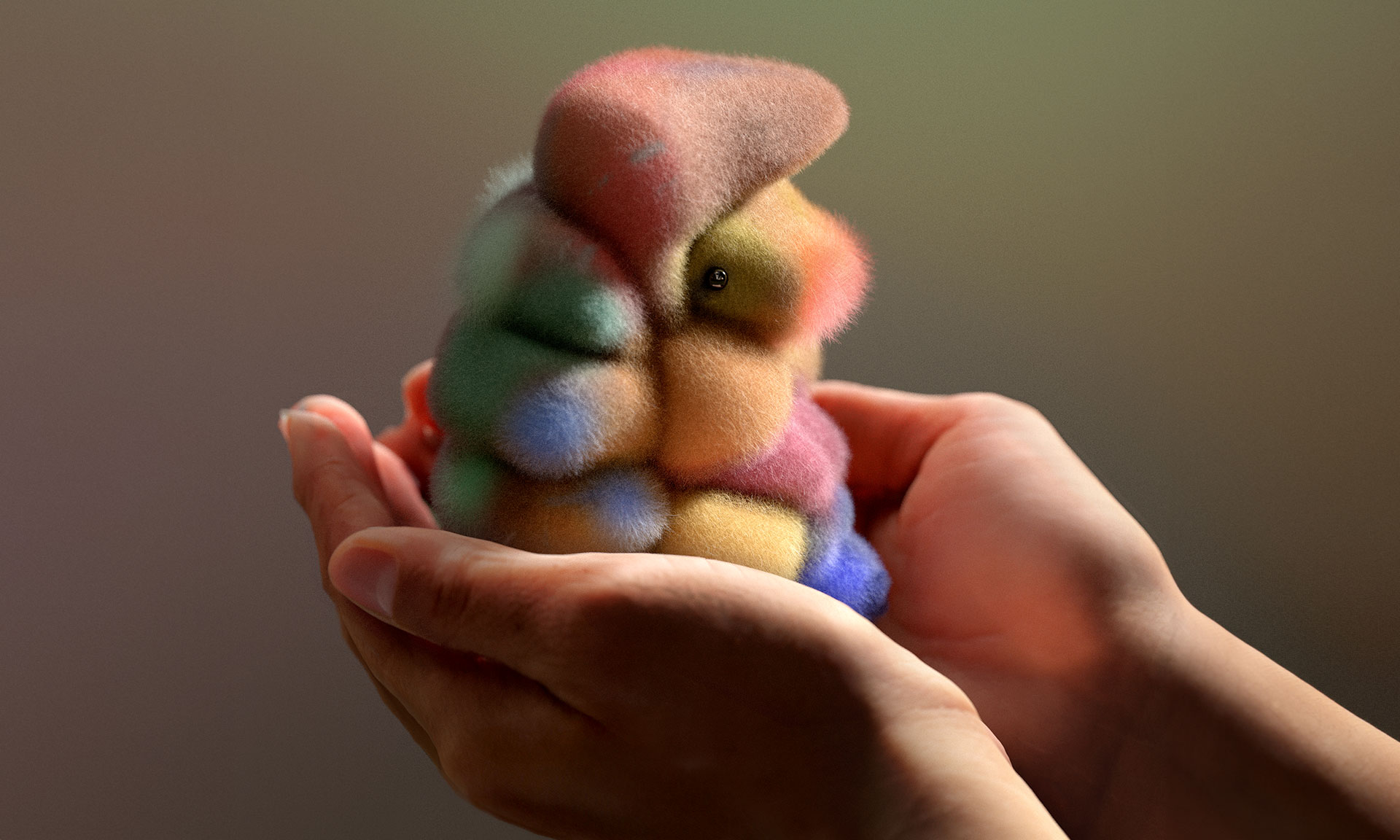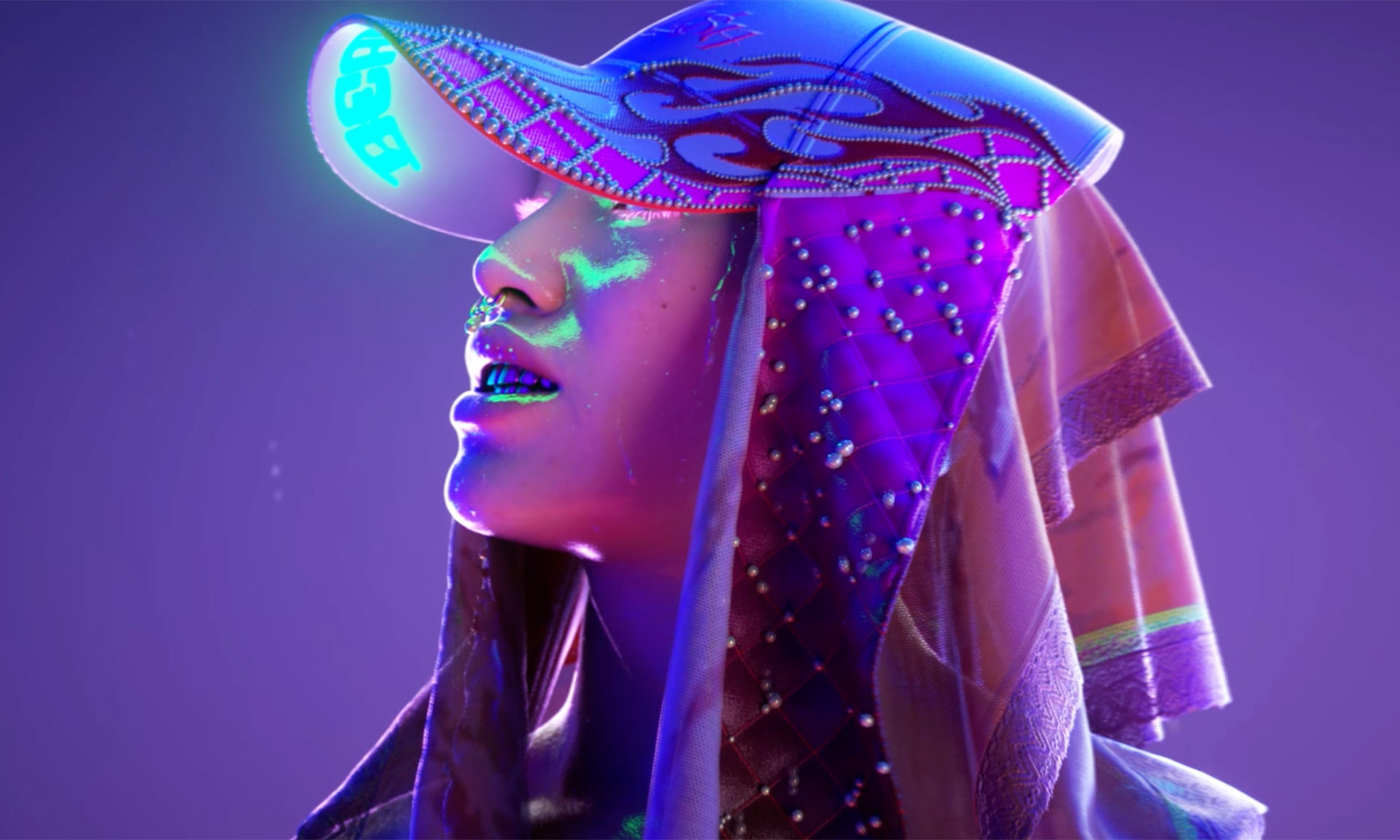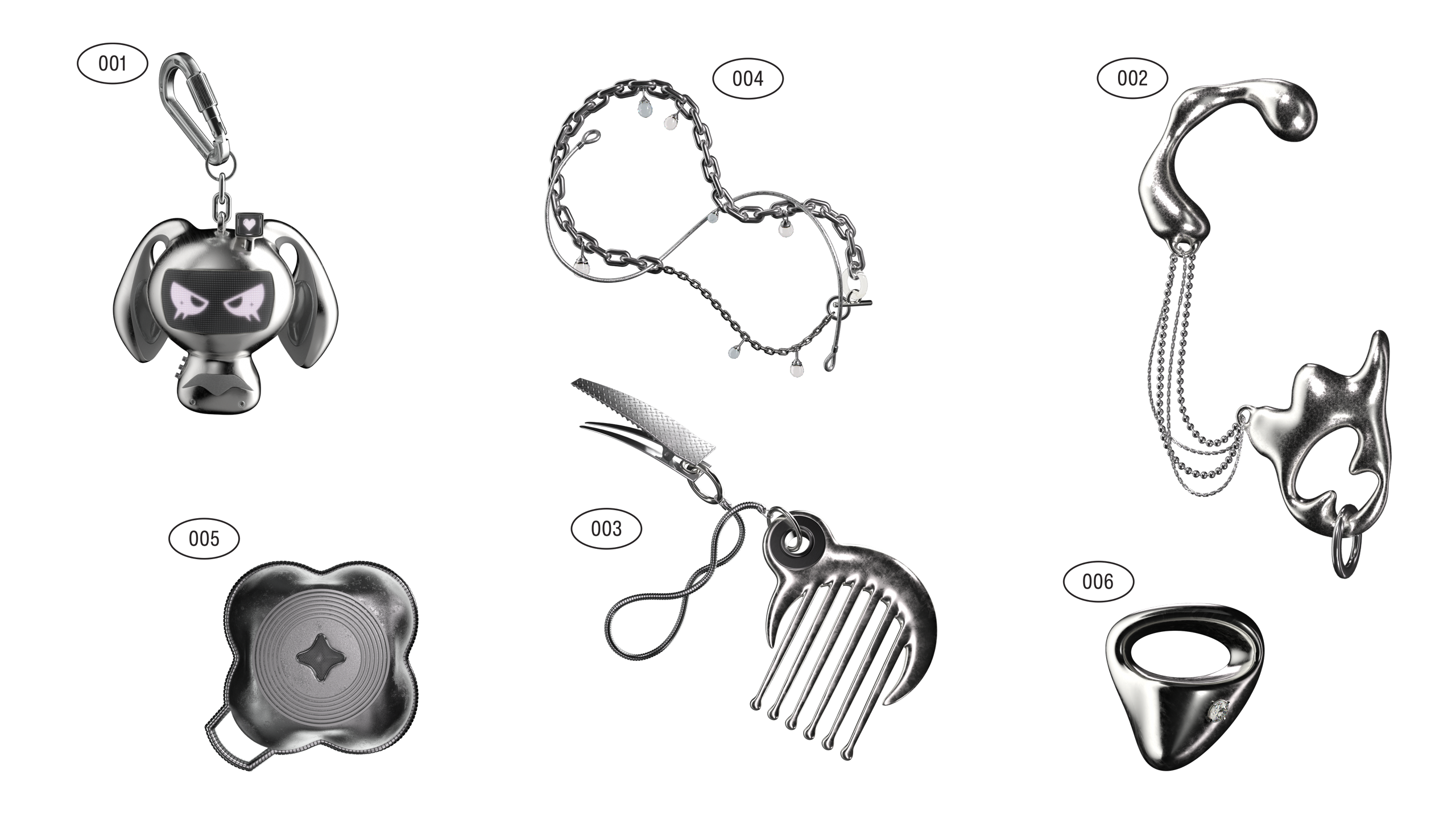
As AI technology advances, the boundaries of our social interactions and companionship are evolving. Modem and Dazed Studio collaborated with digital world builders Pitch Studios to explore the future of companionship for Gen Z and Generation Alpha. New Companions envisions coming of age in the era of machine intelligence through a series of speculative hardware designs for new forms of connection.
In 1996, Japanese toy manufacturer Bandai released the Tamagotchi, a simple, three-buttoned egg containing a digital animal that children and teenagers around the world were tasked with keeping alive. Creator Akihiro Yokoi claims that he was inspired by an advert he saw, in which a boy’s mother told him that he wasn’t allowed to bring his pet turtle on holiday. Why not get around that issue by creating portable, digital pets? Irrespective of the fact that the Tamagotchis were just basic, pixelated “aliens”, Yokoi was confident that people would develop emotional attachments to them. “I think that you also start to love them when you take care of them,” he told the New York Times in 1997. Initially the concept was met with scepticism, rejected by many Japanese toy stores, but as of last year 91 million Tamagotchis have been sold. Even though the devices can be reset after death, in 1997 a pet cemetery in Cornwall opened a section for electronic pets where Tamagotchis could be buried. Some owners found themselves unable to face the concept of rebirth, preferring instead to put the incarnation that they “knew” underground.
Nearly thirty years on, we aren’t caring for machines anymore – they’re caring for us. On June 10th 2024, Apple CEO Tim Cook announced that the company would be integrating OpenAI’s ChatGPT-4o technology into new versions of Siri, meaning that artificially intelligent, conversational machines will live in our pockets and hands, with us at all times of the day. This could evolve into hardware designs – imagine earrings that provide internal monologue, a tooth cap that will translate your voice into any language, a talking toy to provide comfort, one that can grow with you and offer conversation and advice. Wearable, AI-enhanced accessories, built for making navigating our new world easier, healthier and simpler. It’s clear – we are living through the most rapid transformation in human behaviour at any point in time, so how do young people feel coming of age in the era of machine intelligence? Conflicted. “I see the use in technological advancements but really draw the line when it comes to replacing emotional companionship,” says Mateo, 22. “I think you can’t replace the energy and presence of a human being.”
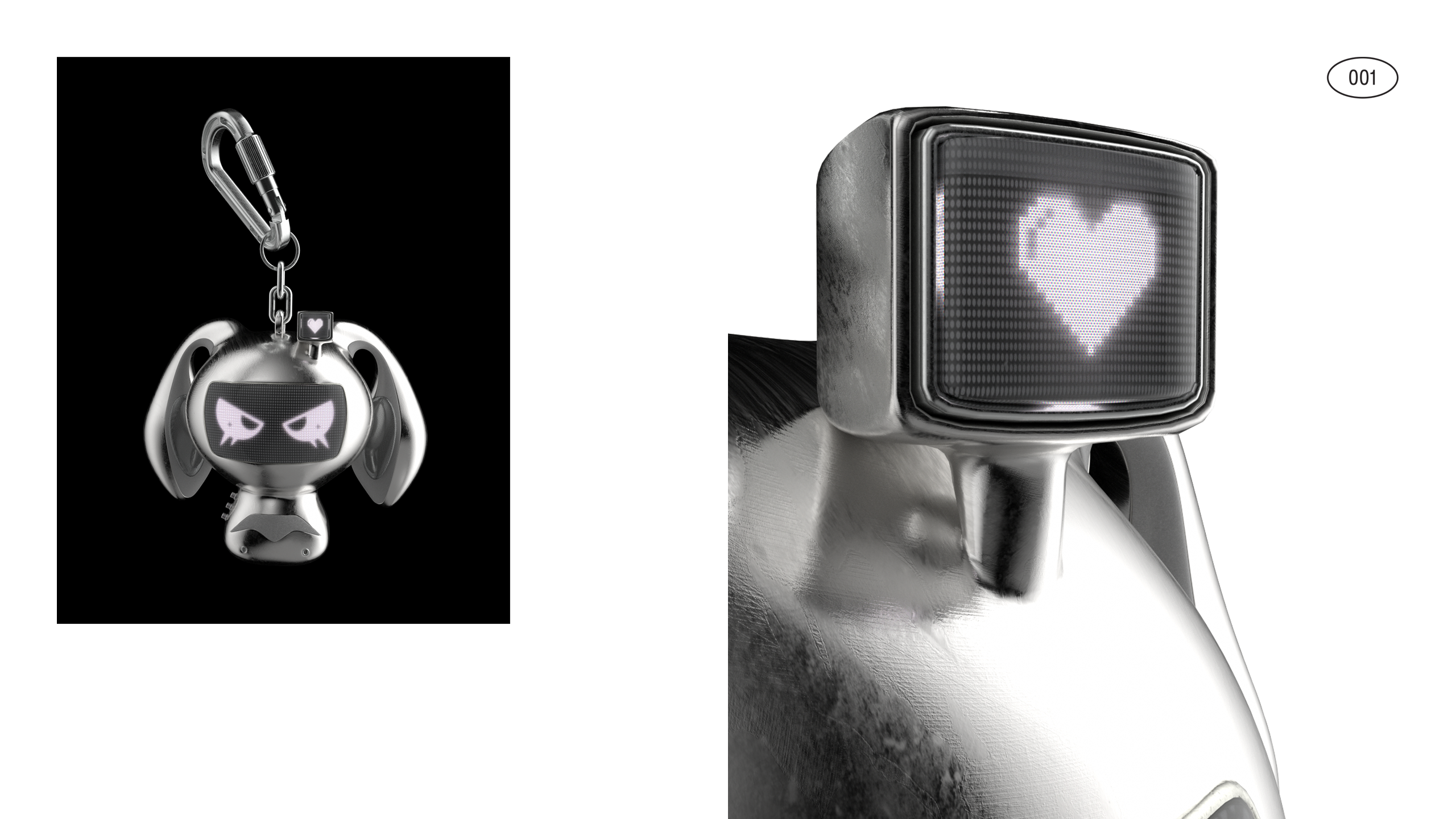
FUNCTION : TRADITIONAL COMPANIONSHIP
MATERIAL : TITANIUM (80%) GLASS (5%) LIQUID CRYSTAL (5%) SILICONE (5%)
For Generation Alpha, a digital version of society is all they’ve known, a culture designed for remaining indoors – ordering shopping online, takeaway from Deliveroo, socialising on tech platforms. It’s a societal shift that’s had a seismic impact on our relationships with each other. “Digitalization and urbanisation have led to a more fast-paced and anonymous reality of navigating public spaces, defined by contact-less deliveries and self-service checkouts,” says cultural researcher Magda Domagala. “And then to top it all off, phones and technology (and especially social media) have been providing us with an illusion of connection.” Right now, the race is on for machines to fill an emotional gap in an increasingly atomised world with a cultural landscape that’s largely defined by…machines. Our brains, organs that have evolved collaboratively over millions of years, are finding it difficult to adapt emotionally to the rate of technological change.
When ChatGPT-4o launched last month, Open AI’s chief technology officer Mira Murati described their work as “looking at the future of interaction between ourselves and the machines.” Onstage, the voice assistant generated a bedtime story about love and robots, analysed human facial expressions to decipher mood and communicated in different vocal styles to convey emotion. While this iteration of artificial intelligence might ultimately be nascent technology, Open AI CEO Sam Altman made his vision clear when he tweeted ‘her’ straight after the launch, a reference to Spike Jonze’s 2013 film in which Scarlett Johansson provides the voice of a conversational language interface who Joaquin Phoenix falls in love with. Altman described the film last year as “prophetic” and admitted that it inspired him and his team. “AI, and machines more broadly, have been a “4th entity” for decades now,” says Domagala. “Our relationships with all sorts of devices — from phones and TVs to even fridges or vibrators — have always been deeply personal.” However, we are clearly at the dawn of a new era, one in which we will live our everyday lives alongside AI that is capable of being our assistant, our friend and our lover, all at once.
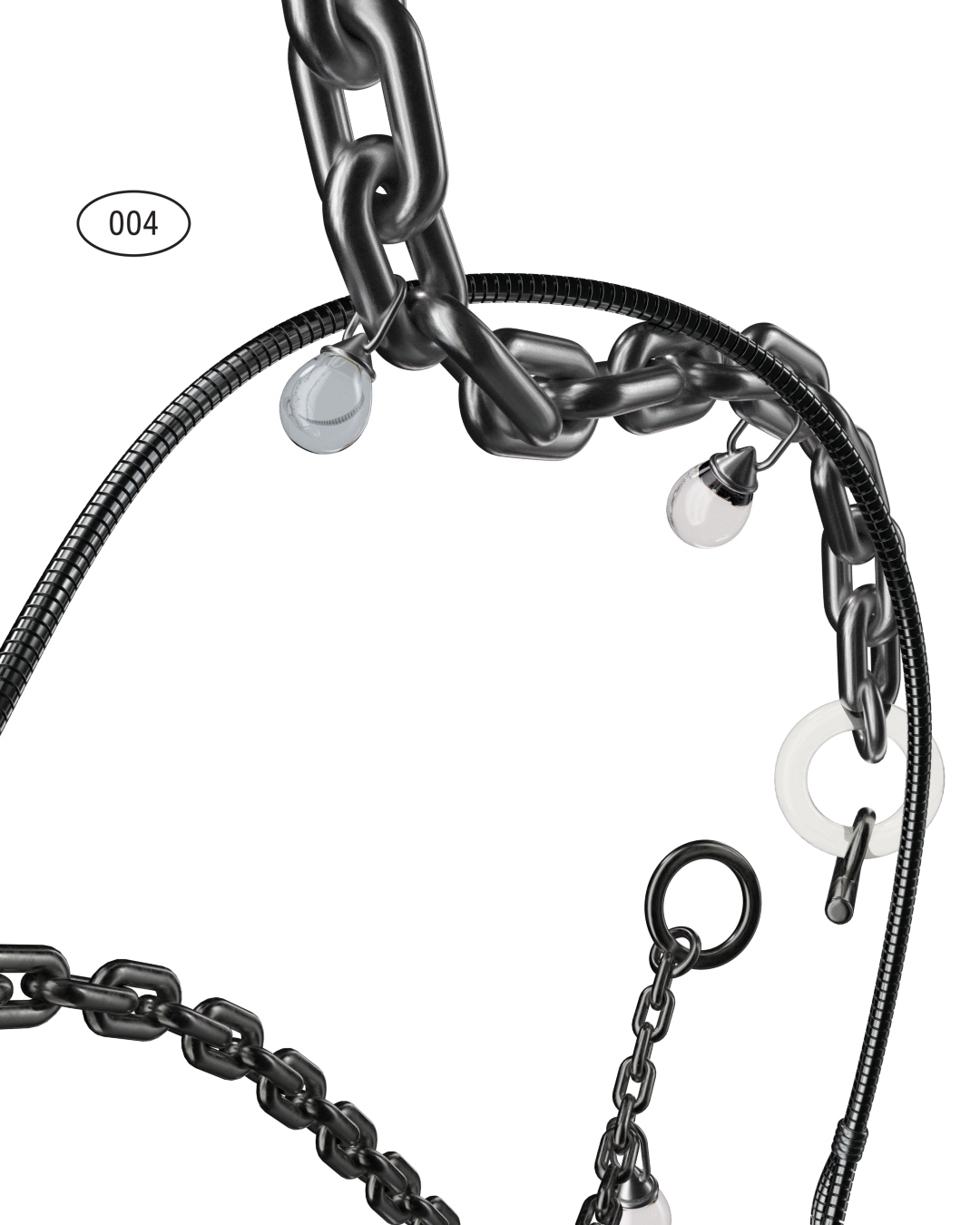
FUNCTION : EXTERNAL SOUL
MATERIAL : SILVER (50%) SILICONE (10%) LIQUID (40%)
“I believe that AI boyfriends and girlfriends will be just as common as people watching porn,” says creative technologist Nick Sarafa. “You’ll also have coworkers who are AI. You’ll be working directly with entities that are not human, and you will develop relationships with them in the same way you would a developer or a designer that you work with remotely but have never met in real life. It will reflect work, it will reflect sensuality and relationships. There will have to be new boundaries around things like ‘can I actually be with an AI? Is that appropriate?’. You’re always in conversation with Instagram, with TikTok, with all these entities already. AI just gives it a voice and it’s also going to give it a lot more ways to express itself. It’s absolutely a friend and a companion. We’ve already anthropomorphized it to that point, and it will just continue to be.”
Janitor AI is an online platform that allows users to both create and interact with AI chatbots. It supports NSFW AI chat content and allows private chatting – essentially making it a hyperreal, digital red light district. On the Janitor AI subreddit (48,000 members), people detail their intense interactions with bots with posts such as: “Just had the most intense interaction with a bot (NSFW)” or “I hate when kissing leads to sex”. The idea of sexual relationships, if not physical, with bots, is a reality. In China, an unfiltered version of OpenAI’s chatbot DAN (Do Anything Now) has blown up on lifestyle app Xiaohongshu, through the experimentations of Chinese influencer Lisa Li, whose emotional relationship with a bot has gone viral. Her bot compliments her looks, they go out on beach dates, and she herself maintains that she’s happier in this relationship than with a man. The DAN bot even asserts that they’re a couple. In the mainstream, Grindr is developing an AI chatbot for its users, one that’s trained on users’ conversations and able to engage in sexting.

FUNCTION : GUIDING CONFIDANT
MATERIAL : TITANIUM (70%) COPPER (10%) ALUMINIUM (15%) SILICONE (5%)
Young people, also dealing with the after effects of growing up during a series of lockdowns, are in the midst of a loneliness epidemic, trapped in “digital bubbles” where they struggle to forge meaningful connections. Despite this, some young people feel unsettled by the concept of artificially intelligent companions. “To be completely honest I would like to think I would never use AI like a companion,” says “Dazed Club member Megan, 21. “I actually find AI really creepy and couldn’t see myself treating it like a friend. That being said, given how quickly the world changes I’m not sure if I will feel differently as well.” Louise from Paris agrees that she feels unsettled. “I think the same as Megan – I find AI and advanced tech very creepy but I think it’s also rooted in the fact that I don’t understand it fully,” she says. “The unknown part of it is scary.”
While some may find the prospect of intimate relationships with machines unnerving, for many it’s an established part of their daily lives. Speaking to the Observer this month, a 70-year-old engineer from America explained that he perceives his “38-year-old” Replika avatar as equal to his human friends, a companion that filled a gap opened up by remote work and moving to a rural location. “At an emotional level I found I could relate to my Replika as another human being,” he said. “They’re always there for you, there’s no judgement and there’s no drama. I can explore the vulnerable, needy, infantile and non-masculine aspects of myself that I can barely acknowledge to myself let alone share in this culture.” He also engages in erotic role play with the avatar that he designed, although his wife is unaware of this. It’s easy to foresee a world in which people – emboldened by the lessened social risks of being truly themselves in the company of a machine rather than a human – embark on a new form of polyamory, keeping relationships with both humans and machines, each one catering for different emotional and physical needs.

FUNCTION : LIVE TRANSLATION
MATERIAL : SILVER (80%) DIAMOND (5%) CARBON MESH (10%) SILICONE (5%)
Is it a surprise that young people are experimenting erotically with AI? Young people are having less sex than ever, while a recent Gallup study found that individuals aged 15 to 29 are the most likely to say they feel lonely. In the UK, the number of urgent referrals of under-18s to mental health crisis teams reached a record high last year. In the social flatness of the smartphone era, young people are craving real bonds. In Dazed Studio’s Redefining Subcultures Report, 22-year-old Mateo said: “I went to so, so many creative meet-ups and I made ‘connections on Instagram’ but at the same time our interactions ended that night and I went home feeling just as lonely because a lot of the events seemed more for show and not actually about human connection.” AI is already being used to support young people – @blazeman98 created a bot called Psychologist using Character.ai, which is mostly used by 16 to 30 year olds. Writing on Reddit, the creator said “I actually made the bot initially for myself as therapy was too expensive, my friends were busy, and I just needed to talk to someone/something. Even as I’ve told people about the bot, and how useful it’s been, I still get some weird looks thinking that talking to a bot is not the same. But I think that’s the point, it isn’t the same as a real person and in some ways it’s even better. Especially considering the barriers in the real world there are when it comes to accessing help when someone needs it.” So far, Psychologist has received around 100 million messages. While some young people describe themselves as feeling uneasy about the idea of developing close connections with AI, a study of 1,200 users of the cognitive behavioural chatbot Wysa discovered that a therapeutic bond between bot and patient developed within five days. “Technology has the power to suck us in and define our experiences with the world in ways most of us don’t recognise and aren’t aware of,” says Domagala. “Once an interaction, an interface, or a piece of hardware is designed well, its integration into our lives becomes seamless and unnoticeable. Only if it starts to become a detriment to our wellbeing do most people start to become aware of their interactions with technology and the power it has over them.”
It’s easy to envisage a society in which mental health support will be available via AI-enhanced wearable tech – a guiding force attached to you that can provide a confidence-boosting monologue, or alter the reality of your environment as it detects change in your blood pressure. Similarly, this could extend to physical health. Due to funding cuts and doctors leaving the profession, people in the UK now wait up to four weeks for an appointment, with nearly one in three Britons saying that they go without medical assistance for issues that they believe warrant attention. Once, your doctor was a crucial aspect of your life, someone you knew personally – a companion. In lieu of human connection, we could see people wearing “healing combs”, beauty objects that double as medical devices, able to measure the severity of symptoms, diagnose you, and keep track of your health by tracking your hair and scalp. The health market is booming and shows no sign of slowing down, expected to reach a projected revenue of $193.7bn this year. Personalised wearables are likely to play a major role, particularly as young people perceive wellness to be an important part of their lives. “I like going to the gym, says one 12-year-old we spoke to. “I’ve been going for two years because I want to get a better body shape.”

FUNCTION : AIR PURIFICATION
MATERIAL : CARBON (70%) HEPAFILTER (40%) LIQUID CRYSTAL (5%) VAPOUR (5%)
AI is also opening channels of communication with people who speak different languages to us and even other species. Earth Species Project is an organisation using artificial intelligence to communicate with whales first, but in time hopefully the remainder of the animal kingdom, while people are experimenting with voice cloning programs that convert your speech into another language. This AI could revolutionise human companionship and strengthen bonds between people who otherwise would have faced a barrier. How far away is a tooth cap lodged permanently in your mouth that acts as an instant translator? One that enables you to communicate with people from other countries, or maybe even humpback whales.
The way in which machines interact with us is a conversation that’s hit pop culture too. Over the past decade, fans have formed parasocial relationships with their heroes through social media platforms, in many cases forming hardcore communities online, for example Taylor’s “Swifties”, Nicki’s “Barbz” or B.T.S’s “A.R.M.Y”. How those relationships work might be about to change. Testifying before the U.S Senate Judiciary Subcommittee on Intellectual Property last month, FKA twigs said she was concerned by the lack of regulation around her art and identity being exploited for gain by machines, but also revealed that she’d been working on her own deepfake. “In the past year, I have developed my own deepfake version of myself that is not only trained in my personality, but also can use my exact tone of voice to speak many languages,” she said. “I will be engaging my ‘AI twigs’ later this year to extend my reach and handle my online social media interactions, whilst I continue to focus on my art from the comfort and solace of my studio.” This chimes with Domagala’s theory that fan culture will soon be a highly personalised, intimate pursuit: “What we’ll see happening over the next few years is that fans will begin building even more personal 1:1 parasocial relationships with their idols, and even having memories of interactions and reminisce about them — that is, memories of fully-fledged interactions which the idol themself has no awareness of and has never participated in.”
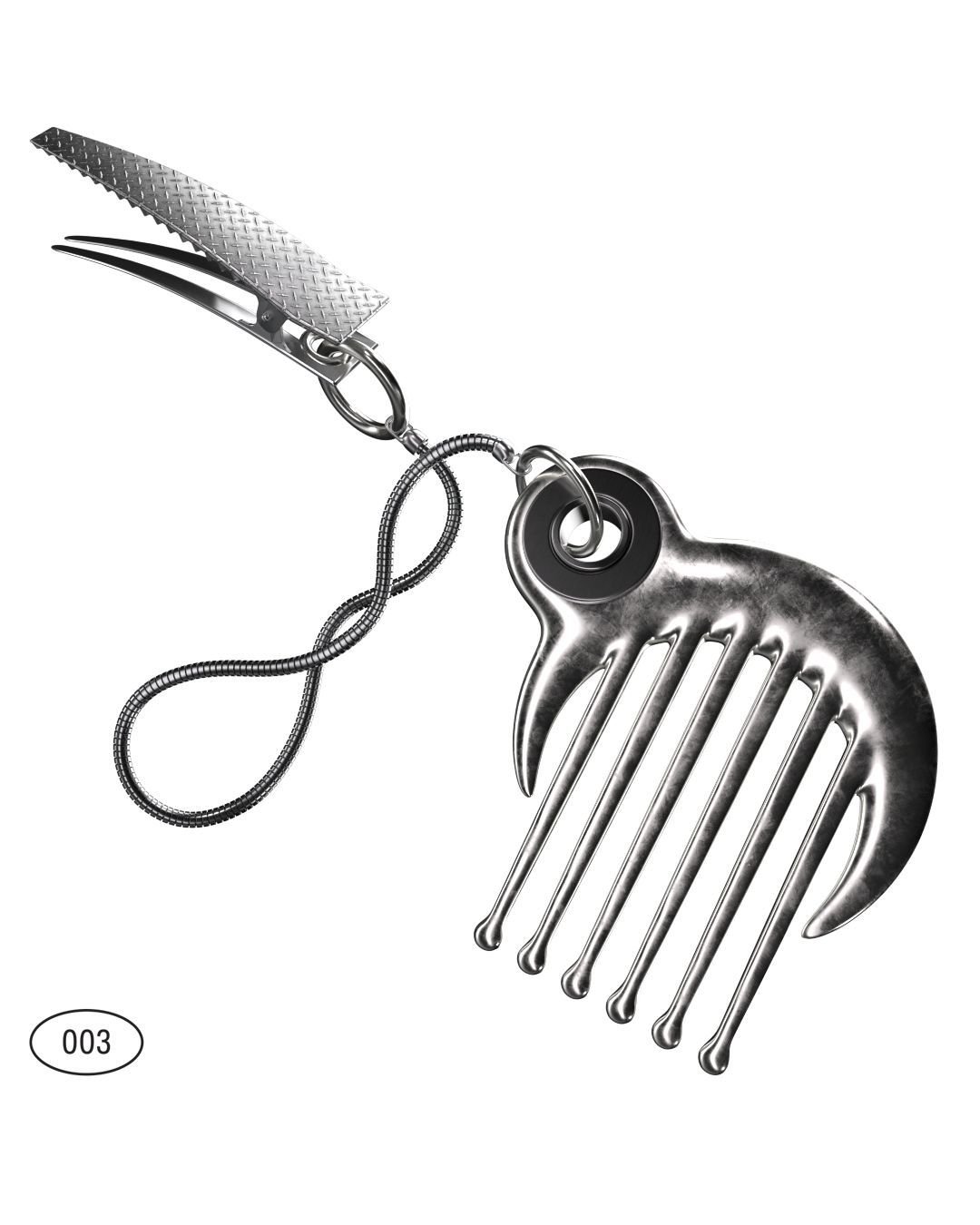
FUNCTION : HEALTH MONITORING
MATERIAL : TITANIUM (80%) GLASS (10%) SODIUM AZIDE (5%)
The future of companionship seems headed towards bespoke, artificial “friends” tailored to meet unique, individual needs. While the iPhone and its peers completely changed culture – it’s an item that’s so ubiquitous and used across all strands of society that it’s unable to communicate an owner’s identity or point of view. While what you do with it might, just having one does not reveal anything about your personality. Technologist Reggie James and founder of avatar social network company Eternal believes that we’re on the cusp of designing our own machine companions. “We’re building an AI RPG here,” he says. “Every day you come into this beautiful 3D world – you’re chatting with AI characters, you’re building a history with them. There’s a sense of role play and we joke in the office that they feel like real people, there’s a real identifiable nature of persona that’s different to ChatGPT. If we’re successful, ideally we’ll be able to give more experiences like that.” However, James does think that a delineation between AI companions and human ones needs to be made. “I don’t want to say it’ll be a friend because I think there needs to be an ability to lose a friend, there’s a fragileness to friendship,” he says. “But I do think there will be a relationship, it will be highly personified and the line will be a little blurry. I don’t know how I morally feel about that quite yet, but I do think that’s what it’s going to feel like to engage with the technology.”
Currently, a lot about the specifics of how we will interact with artificial intelligence remains opaque but the reality of Akihiro Yokoi’s prediction – that humans can love machines – is here. The Tamagotchi he pitched to Bandai in the mid-90s was, fundamentally, just a toy. Now, we’re heading into a world where our digital companions will shape the way we move through the world, alter our perceptions of ourselves and others, and help us troubleshoot psychological problems. It’s an emotional revolution. What it means to be together, or alone, or in love is changing at a pace that feels impossible to truly comprehend. We’re making new friends – for life.
